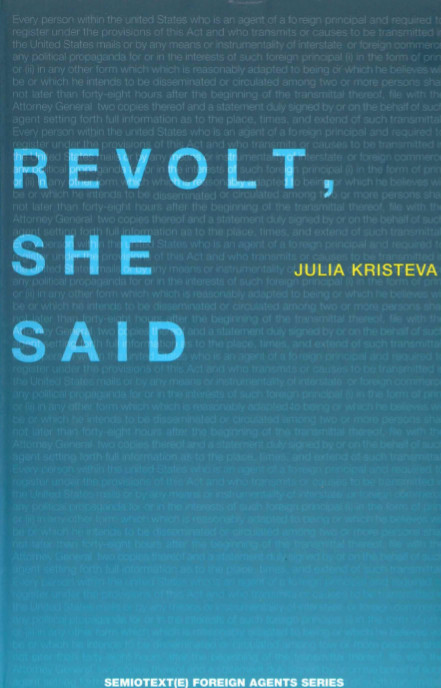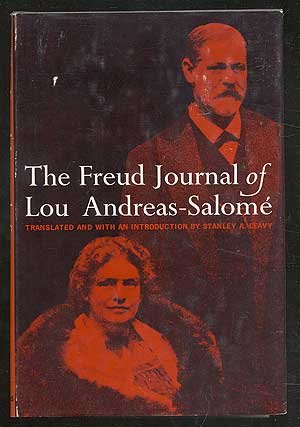Julia Kristeva: Revolt, She Said (2002)
Filed under book | Tags: · art, disobedience, interview, philosophy, politics, psychoanalysis, revolution

“May ’68 in France expressed a fundamental version of freedom: not freedom to succeed, but freedom to revolt. Political revolutions ultimately betray revolt because they cease to question themselves. Revolt, as I understand it—psychic revolt, analytic revolt, artistic revolt—refers to a permanent state of questioning, of transformations, an endless probing of appearances.
In this book, Julia Kristeva extends the definition of revolt beyond politics per se. Kristeva sees revolt as a state of permanent questioning and transformation, of change that characterizes psychic life and, in the best cases, art. For her, revolt is not simply about rejection and destruction—it is a necessary process of renewal and regeneration.”
An Interview by Philippe Petit
Translated by Brian O’Keeffe
Edited by Sylvère Lotringer
Publisher Semiotext(e), 2002
Foreign Agents series
ISBN 1584350156, 9781584350156
139 pages
Reviews: Simone Roberts (Common Knowledge), Pramod K. Nayar (Philosophy in Review), Philip Goodchild (Ars Disputanti), Adrian O. Johnston (Metapsychology).
PDF (updated on 2017-6-26)
Comment (0)Lou Andreas-Salomé: The Freud Journal (1958/1964)
Filed under book, personal journal | Tags: · love, memory, narcissism, psychoanalysis, sexuality

Lou Andreas-Salomé (1861–1937) was a Russian-born psychoanalyst and author of studies on Nietzsche and Rilke.
In 1911, she participated in the International Psychoanalytic Congress in Weimar, and shortly after went to Vienna to undergo a training analysis with Freud. Written during the years 1912-1913, the journal begins with her participation in his Wednesday evening study group and Saturday evening lectures. Following her training, Salomé worked together with her friend the physician and analyst Viktor Tausk at Frankl-Hochwart’s clinic in Vienna and attended both the meetings of the Vienna Psychoanalytic Society and the discussion evenings hosted by Alfred Adler, all reflected in the diary.
Originally published as In der Schule bei Freud, 1958
Translated and With an Introduction by Stanley A. Leavy
Publisher Basic Books, New York, 1964
211 pages
review (Ban Wang, American Imago)
Salomé’s biography at padd.at
Salomé at Wikipedia
PDF (112 MB, no OCR)
See also Victor Tausk’s On the Origin of the “Influencing Machine” in Schizophrenia (1919/1933)
Henry Bond: Lacan at the Scene (2009)
Filed under book | Tags: · crime, criminology, film, forensics, photography, psychoanalysis, psychology

“What if Jacques Lacan–the brilliant and eccentric Parisian psychoanalyst–had worked as a police detective, applying his theories to solve crimes? This may conjure up a mental film clip starring Peter Sellers in a trench coat, but in Lacan at the Scene, Henry Bond makes a serious and provocative claim: that apparently impenetrable events of violent death can bemore effectively unraveled with Lacan’s theory of psychoanalysis than with elaborate, technologically advanced forensic tools. Bond’s exposition on murder expands and develops a resolutely Zizekian approach. Seeking out radical and unexpected readings, Bond unpacks his material utilizing Lacan’s neurosis-psychosis-perversion grid.
Bond places Lacan at the crime scene and builds his argument through a series of archival crime scene photographs from the 1950s–the period when Lacan was developing his influential theories. It is not the horror of the ravished and mutilated corpses that draws his attention; instead, he interrogates seemingly minor details from the everyday, isolating and rephotographing what at first seems insignificant: a single high heeled shoe on a kitchen table, for example, or carefully folded clothes placed over a chair. From these mundane details he carefully builds a robust and comprehensive manual for Lacanian crime investigation that can stand beside the FBI’s standard-issue Crime Classification Manual.”
With a Foreword by Slavoj Zizek
Publisher MIT Press, 2009
Short Circuits series
ISBN 0262300095, 9780262300094
233 pages
Review: Daniel Hourigan (Metapsychology, 2010).
Comment (0)
